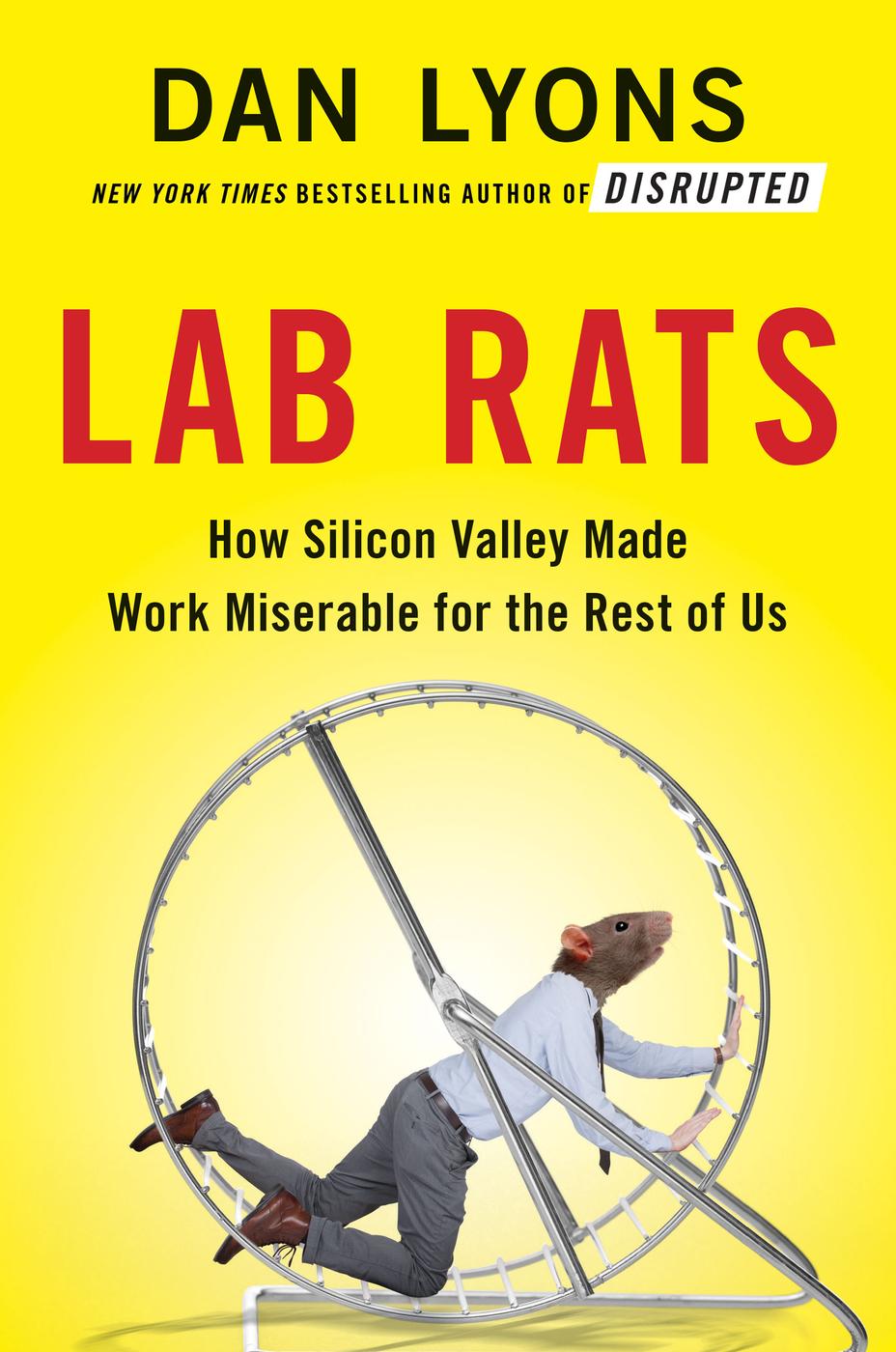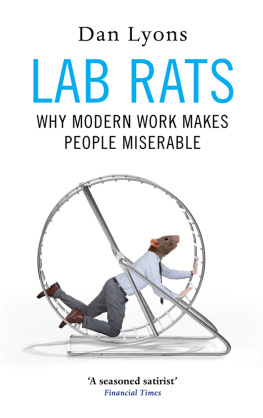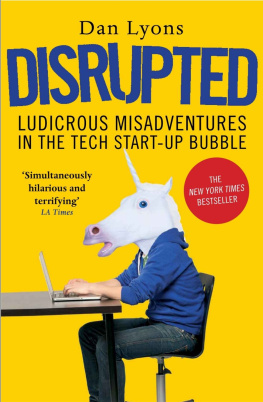
Copyright 2018 by Dan Lyons
Interior rat illustration by Samuel Bennett
Jacket design by Amanda Kain
Jacket copyright 2018 by Hachette Book Group, Inc.
Hachette Book Group supports the right to free expression and the value of copyright. The purpose of copyright is to encourage writers and artists to produce the creative works that enrich our culture.
The scanning, uploading, and distribution of this book without permission is a theft of the authors intellectual property. If you would like permission to use material from the book (other than for review purposes), please contact permissions@hbgusa.com. Thank you for your support of the authors rights.
Hachette Books
Hachette Book Group
1290 Avenue of the Americas
New York, NY 10104
hachettebooks.com
twitter.com/hachettebooks
First Edition: October 2018
Hachette Books is a division of Hachette Book Group, Inc.
The Hachette Books name and logo are trademarks of Hachette Book Group, Inc.
Certain names and identifying characteristics have been changed, whether or not so noted in the book.
The publisher is not responsible for websites (or their content) that are not owned by the publisher.
The Hachette Speakers Bureau provides a wide range of authors for speaking events. To find out more, go to www.hachettespeakersbureau.com or call (866) 376-6591.
LCCN: 2018948927
ISBNs: 978-0-316-43537-6 (hardcover), 978-0-316-43536-9 (ebook)
E3-20181010-PC-DA
Once again, with all my love, for my three best friends: Sasha, Sonya, and Paul.
Every age has its peculiar folly: Some scheme, project, or fantasy into which it plunges, spurred on by the love of gain, the necessity of excitement, or the force of imitation.
Charles Mackay, Extraordinary Popular Delusions and the Madness of Crowds, 1841
O n a Wednesday morning in June 2017, I find myself in Menlo Park, California, sharing a small table in a faux European coffee shop with a woman Ill call Juliaand Im making a duck out of Legos.
Outside, its sunny and warm. A late-morning breeze ruffles the big bright-colored umbrellas above the tables in the plaza. Inside, young techies gaze up at the chalkboard menu above the counter and sit at tables clicking at laptops. Django Reinhardts guitar emanates from hidden speakers. Nobody pays any attention to the two gray-haired people sitting over near the window with their plastic toys.
Julia and I have never met before. Shes a cheery, round-faced woman in her fifties with a disarming smile and an easy laugh. Julia arrived carrying a big canvas bag filled with Legos, and theyre now scattered out on the table. As were making small talk, she plays with the pieces, idly snapping and unsnapping them. Soon, between sips of my caff Americano and bites of a remarkably good almond croissant, I start tinkering with the Legos, too.
A few years earlier I briefly worked at a Silicon Valleystyle start-up in Boston, a disastrous experience I chronicled in my last book, before getting a job as a writer on the HBO comedy Silicon Valley. Today, I have returned to the setting of that showwhich, while a real place, is also a state of mindnot for fun, but for research. For the last two years, I have made it my mission to speak to as many people as I can to better understand the modern workplace and why work today seems to make so many people unhappy. My theory is that at least some of the unhappiness at work comes from being herded into silly workshops where people are fed a bunch of touchy-feely nonsense about self-improvement and transformation.
Thats how Ive come to be on this coffee date. Julia makes a living running the weirdest kind of corporate workshops Ive heard about so far. In Julias workshops, she asks people, office workers like I once was, to play with Legos. This is an actual thing now, and the people who teach this take it very seriously. The methodology is called Lego Serious Play, and Julia is one of thousands of people who have become certified to run LSP workshops. Huge companies, including Unilever, Johnson & Johnson, and Google, have embraced it.
When I first heard about Lego workshops I thought someone was pulling my leg. I was talking to a corporate trainerIll call him Edwardwho said, You know, should talk to some of my friends who are certified in Legos.
Excuse me? I said.
Im serious, he said. He insisted that Lego training really helps people get better at their jobs. Its powerful, Edward said. The Legos are a prop. They help get people to talk about how they feel about things, unfiltered. Its like kids who have been abused, and they talk through a doll. People talk through their Legos.
Oh dear God. I closed my eyes and pictured a bunch of poor Jims and Pams talking through their Legos, pouring their hearts out to a team of New Age quacks. This could be either the worst thing or the best thing I might ever see in my entire life. Maybe both.
Edward gave me a name and a number. Soon I was talking to one of the top Lego trainers in the world, a man who lives in Southern California. He put me in touch with Julia, who lives in Silicon Valley, a few miles from where Im staying.
Im a little disappointed, because I came here expecting, and actually half hoping, to meet a complete nut job or a shyster. Unfortunately, Julia appears to be neither. Shes very bright and really sincere. She has a masters degree in engineering and spent two decades writing software inside some serious organizations. Moreover, I really like her. I dont want to make fun of her. And yethere we are, in a coffee shop, playing with Legos.
It gets people talking, Julia says. She tells me about the brain science that supposedly explains how Lego Serious Play works. There is, in fact, a body of scholarly looking research around LSP discussing things like the cerebral cortex and the limbic system. Julia says LSP is especially useful with software programmers, who tend to be introverts, because it creates a safe space where they can talk. Lego workshops also help Type-A top executives stop being such overbearing assholes, and can even be a catalyst for changing an entire organization, she claims. I can see why HR departments go nuts for this. HR people used to be glorified office managers, but now they get MBAs and are called Chief People Officers. They talk about being strategic talent managers who drive corporate transformation and are building the workforce of the future. Theyre suckers for pop neuroscience, and though most wouldnt know an amygdala from an anal wart, they will jump on anything that they think can rewire the brain circuitry of their employees. Lego Serious Play promises to do just that, and comes wrapped in just enough scientific-sounding literature to make it seem legitimate.
To me these sessions sound like a waking nightmare, like a cross between an EST seminar and group therapy, with the added insult of toys. Julia swears its not like that. Sure, at first, some people are pretty skeptical, but theyre quickly won over.
In just the past few years LSP has become a booming industry. There are LSP consultancies and LSP conferences. People write LSP books, LSP white papers, and LSP articles on LSP websites. Theres even a Global Federation of LSP Master Trainers. The concept was created in the 1990s by two business professors in Switzerland who drew on research in psychology and educational theory. Over time people started adding in theories about brain science. By one estimate more than ten thousand people have become certified Lego facilitators, and more than one hundred thousand people have participated in Lego workshops.








